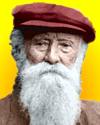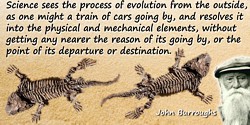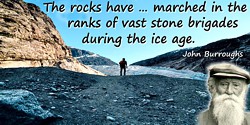 (source)
(source)
|
John Burroughs
(3 Apr 1837 - 29 Mar 1921)
American naturalist and author whose many writings and books, by celebrating nature in highly readable essays, significantly nurtured the conservation movement in the United States.
|
From Under the Apple-Trees (1916)
Chapter XV - GREAT QUESTIONS IN LITTLE
by John Burroughs
I. THE ETHER
[p.289] TO speak of invisible rays of light seems a contradiction of terms, and so it would be were light rays an objective reality instead of an experience of our consciousness. The dark, or heat, rays of the spectrum are as real as the light rays, but we see them not because our eye is not attuned to them, or in their key. It is said that the Leyden jar emits rays that obey all the laws of optics, but the eye is no wiser for it. Light is created in the eye, as sound is born in the ear. Certain vibrations in the ether give us a sensation that we name “light”; certain vibrations in the air give us sensations that we call “sound.” All the color in nature is the result of what the vibrations reflected from objects do to the eye, just as all we call sound is the result of what certain mechanical disturbances in the air do to the ear. There is no color in the dark and there is no sound in a vacuum. We can set up a mechanical disturbance in the air, but we cannot set up a mechanical disturbance in the ether, because the ether is not a tangible body. It defies all our definitions of tangible bodies. No device or [p.290] experiment of man has as yet been able to detect it or prove its existence. It is a metaphysical necessity. We are compelled to assume its existence to account for such phenomena as light, electricity, and gravity. We can produce a vacuum as regards the air, but not as regards the ether. The ether has no mechanical reality. It is the negation of all mechanics, of all matter. The physicists are driven to the necessity of describing matter as a hole in the ether. But how can there be a hole in that which is the negation of matter? It is like trying to think of a hole within a hole, or a nest of holes, like a nest of boxes. But our scientific philosophers are not disturbed by such things. Necessity in science, as in war, knows no law, and our need for the ether is so great that we must have it even if it negatives all the rest of our knowledge. It is, so to speak, the connective tissue of the cosmos, it makes the cosmos one and inseparable. It is the unchangeable, the all-present, the everlasting. It satisfies the needs of the mind for an all-embracing reality, for a primal stuff out of which all things arose, for an immaterial reality which is the parent and master of matter. It is the sea of energy in which the cosmos floats. It affords the key to the well-authenticated cases of mind-reading, telepathy, and all genuine occult phenomena. It gives us a glimpse behind the veil of things; it adds a new chapter of wonders to this universe of wonders [p.291] — wonders beneath wonders everywhere; it supplies the missing link between matter and spirit; it helps us to understand the unity of things — that all are of one stuff, that near and remote are the same, that celestial and terrestrial join hands; it helps us to grasp the phenomena of magnetism, of electricity, and of gravity, and of the vital interchange, so to speak, between all the hosts of heaven. “Not a hawthorn blooms,” says Victor Hugo, “but is felt at the stars.” If the ether is a reality, this may be true. “The divine ship” (the earth), says Whitman, “sails the divine seas.” The ether is this shoreless and soundless sea — the sea in which all worlds and systems float like bubbles.
- Science Quotes by John Burroughs.
- 3 Apr - short biography, births, deaths and events on date of Burroughs's birth.
- John Burroughs - The Friendly Rocks - an excerpt from Under the Apple-Trees (1916), giving a naturalist's view of rocks: “The rocks are not so close akin to us as the soil ... [but they] are the final source of all.”
- John Burroughs - Great Questions In Little: Astronomic Grandeur - an excerpt from Under the Apple-Trees (1916) - reflections on the Universe, the Why and How of science, the Limitations of Science, the Beginnings of Life, and Evolution.
- John Burroughs - context of quote “Stone brigades” - Medium image (500 x 250 px)
- John Burroughs - context of quote “Stone brigades” - Large image (800 x 400 px)
- John Burroughs - context of quote “Evolution” - Medium image (500 x 250 px)
- John Burroughs - context of quote “Evolution” - Large image (800 x 400 px)
- “A Prophet of the Soul” - John Burroughs on Henri Bergson’s philosophy.
- John Burroughs - 'Scientific Faith', from The Outlook (1911)
- Theodore Roosevelt - naturalist - In Memoriam by John Burroughs in Natural History magazine (1913).






